Most people would rather watch Netflix, take out the trash, or even do their taxes before they even want to think about making a will.
50% of Americans still don’t have a will. That’s a massive pool of potential clients! And many are out there using Google and ChatGPT to get estate planning help.
If you’re not showing up, your competitors are. And they’re seizing that $10,000–$25,000+ case right from under your nose.
It’s time we seriously talked about estate planning attorney marketing.
Today, we’re breaking down 17 estate planning tactics to help your firm attract clients consistently and grow faster in 2026.

1. Build Your Ideal Client Profile
The estate planning industry is competitive… like really, really competitive.
You’re fighting off as many as 200,000 estate lawyers in the U.S.. Even a fraction of that in your city is a HUGE number!
Trying to market to “everyone” is a recipe for disaster. Get crystal clear on your ideal client and build your estate planning services marketing around them.
Think of it as creating a “client persona.” Picture an actual person: Sarah, 42, married with two kids, worried about probate and taxes, searching online for answers late at night.
That’s who your messaging should speak to, not “anyone with assets.” Start by interviewing your best clients. Ask them:
- Why did you choose us?
- What worried you most before hiring?

You’ll uncover great insights that no spreadsheet can tell you! Once you know exactly who you’re talking to, every ad, blog post, and landing page writes itself.
Bonus Tip: Want to attract more clients, not just traffic? Check out our complete digital marketing guide!
2. Position Your Estate Planning Firm to Win
How on earth do you stand out in a sea of estate lawyers?
The answer: Get specific.
Instead of “we do everything,” plant your flag in one area clients care deeply about. For example:
- Focus on blended families where inheritance battles often arise.
- Specialize in long-term care planning as nursing home costs top $100,000+ per year.
- Zero in on asset protection for business owners with multimillion-dollar estates.
This isn’t about being bigger or faster… it’s about being different!
For example, Summit Trail Advisors has built its entire identity around serving ultra-high-net-worth individuals and families navigating generational wealth.
That’s what smart marketing for estate planning attorneys looks like: define your niche to attract estate planning clients.
3. Build a Client-Focused Estate Planning Marketing Strategy
TEstate planning clients may not hire a lawyer from a random ad. People often need to see a brand 7+ times before reaching out.
Here’s how to master the multi-touchpoint move:
- Set clear goals: What do you want: More clients? Bigger retainers? Better-qualified leads?
- Pick your channels: SEO for visibility, PPC for quick wins, content and email for trust, social media for engagement.
- Keep it consistent: Every ad, blog, and email should feel like part of the same client journey.
- Check your pricing: Run a quick survey (Google Forms, Typeform) to see what clients expect. Align your fees with value: basic wills for budget-conscious clients, complex trusts for high-net-worth families.
The effort is totally worth it because estate planning practices using multichannel strategies grow their revenue 135% faster.
Tired of wasting money on random marketing tactics? Read our Law Firm Marketing Playbook that serious firms are using to dominate Google search in 2026.
4. Climb the Rankings Ladder and Get Found with SEO
Your estate planning firm must appear on page one of Google. Very few people go beyond it.
Search engine optimization (SEO) is how to get to page one, and how you start pulling in clients consistently.
Here’s what effective estate planning lawyer marketing looks like with on-page SEO:
- Target the right keywords: Local SEO using keywords like “estate planning attorney in [city]” or “living trust lawyer near me” is a great way to get local clients. Use tools like Ubersuggest and Ahrefs to pinpoint lucrative keywords.
- Create helpful content: Answer common client questions like “Do I need a will if I have a trust?”
- Fix technical basics: Fast page speed, mobile responsiveness, link building, and clear headings.
Remember, 53% of website traffic comes from local search results, and those visitors convert at higher rates than paid clicks.
Need proof of SEO for estate planning lawyers? Barr & Douds, a top-tier trust and estate litigation firm, saw a 937% increase in qualified leads and a 4,774% surge in organic traffic after investing in SEO.
If you’d like to talk to an expert… Book a free 15-minute strategy call and let’s grow your estate planning firm together.

Get More Estate Clients Right Here! 100+ lawyers are seeing up to 1,018% more leads at Comrade.
5. Capture Clicks Fast with Pay-Per-Click (PPC) Ads
Want to cut the line and land on top of Google today? That’s the magic of PPC.
With estate planning advertising, you can show up instantly when someone types “estate planning lawyer near me” or other high-intent estate planning keywords.
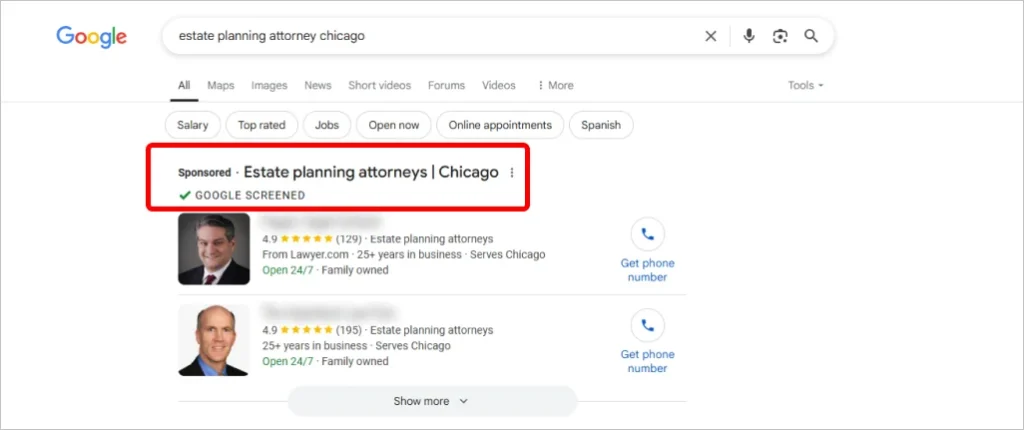
Here’s why PPC is such a game-changer for the modern lawyer:
- Instant visibility: SEO takes months, PPC takes minutes.
- Keyword control: Bid on exactly what matters, from “trust attorney in [city]” to “living will lawyer.”
- Budget flexibility: Whether you’ve got $500 or $5,000, you set the limits.
The legal industry averages a 6.98% conversion rate with PPC, and those numbers climb even higher when paired with strong, tailored landing pages.
Think of PPC as your “fast pass” in the marketing game. It gets you in front of prospective clients the moment they’re ready to hire.
6. Convert Local Clients with a Google Business Profile
When new clients search “estate planning attorney near me,” Google pulls local listings first — often before paid or organic results. If your business listing isn’t optimized, you’re missing calls, clicks, and cases.
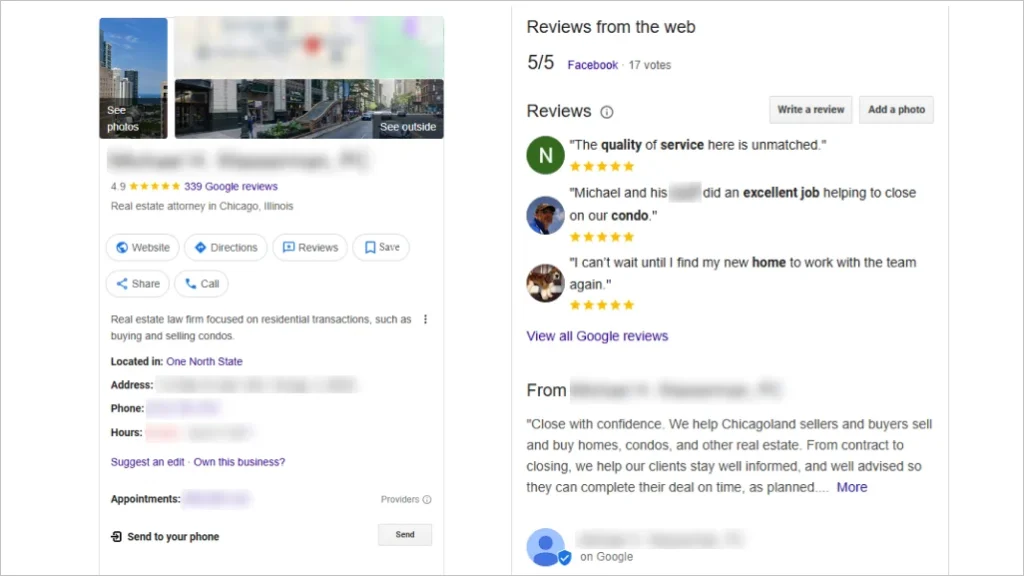
How to level up your online presence:
- Claim and verify your profile via Google.
- Fill out every field — hours, services, address, photos, FAQs, and a compelling firm description.
- Add keywords naturally like “estate planning lawyer in [city]” or “living trust attorney.”
76% of people who search for something locally visit a business within 24 hours, and 28% make a purchase.
For law firms, that can mean consultations booked the same day. It’s one of the highest-ROI tactics in SEO, and it’s free!
7. Design a Website That Converts (Not Just Looks Pretty)
Don’t just build a website. Build a client-conversion engine.
An outdated or confusing site creates friction and loses leads fast. In fact, 75% of users judge a firm’s credibility based on website design (Stanford Web Credibility Project).
To attract and convert estate planning clients, your law firm website needs to be:
- Fast: Pages should load in under 3 seconds, especially on mobile.
- Responsive: Over 60% of legal searches happen on phones. Your site must work flawlessly across devices.
- Clear: CTAs like “Schedule a Free Consultation” should be easy to find and click.
Your website design should also reflect the emotional nature of estate planning — calm, trustworthy, and professional. Highlight your services, showcase testimonials, and even use video marketing to retain visitors.
AI Tip: AI tools like Hotjar or Microsoft Clarity use heatmaps and behavior analytics to show exactly where visitors drop off, helping you fix weak points in your user experience.
8. Win Them Over with Excellent Content
Nobody wakes up saying, “I can’t wait to read a 12-page blog on probate law today.”
But they do ask things like, “Do I really need a will if I’m 40?”. At that point, your content had better be the one with answers. Here’s how to write excellent legal content:
- Answer real questions: “Will vs. Trust” or “What happens if I don’t name a guardian?”
- Use plain English: Don’t say “asset protection strategy.” Say “how to keep your money safe from lawsuits.” Clients love clarity.
- Define your product: Spell out your services like a menu. “Wills” = who gets what. “Trusts” = skip probate. “Healthcare directives” = who makes medical decisions if you can’t.
- Show personality: Share stories, case wins, or even FAQs with a little flavor because boring content gets ignored.
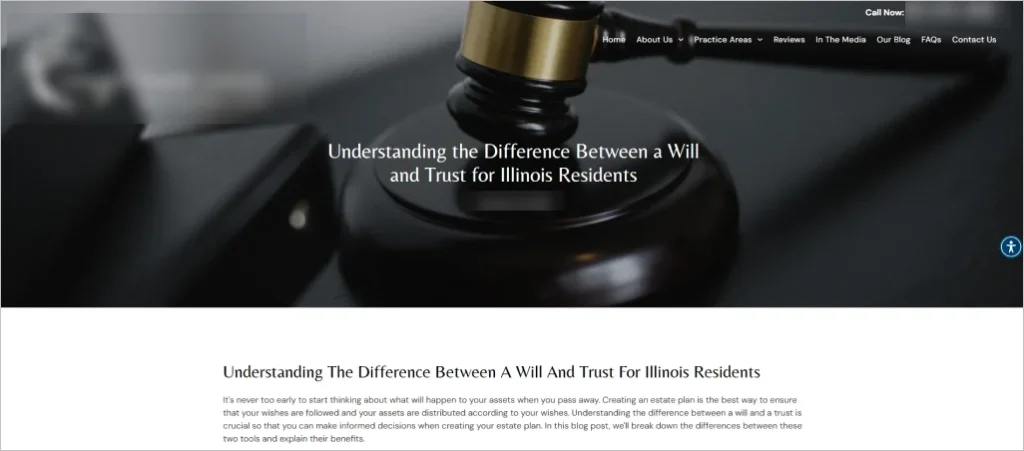
Is the effort worth it? Absolutely! Content marketing generates 3x more leads than old-school ads, at 62% less cost.
At the end of the day, smart marketing for estate planning firms leans heavily into content. It attracts, educates, and inspires trust before you ever hop on a call.
Stop chasing clients. Let your content marketing for lawyers do the chasing for you.

Fill Your Pipeline Today, Tomorrow, and Beyond! Comrade guarantees a fully booked calendar.
Book a Free Consultation9. Stay Top-of-Mind with an Email Marketing Plan
Most estate planning clients don’t hire after one click.
They read, think, procrastinate… then circle back weeks (or months) later. That’s why email marketing is so powerful. It keeps you on their radar without being pushy.
Here’s how to do email marketing for lawyers:
- Lead magnet + welcome email: Offer a free guide like “7 Estate Planning Mistakes to Avoid” and follow up with useful tips.
- Follow-up drip: Send 3–5 short emails on topics like probate, guardianship, or asset protection.
- Client stories: Share testimonials or quick case wins to build emotional trust.
Email is also perfect for staying connected with existing clients. Remind them about expiring wills, invite them to webinars, or share law updates.
And yes, it’s worth it: every $1 spent on email returns $42. With AI tools like Mailchimp or ActiveCampaign, you can even auto-schedule, segment, and test subject lines to make it effortless.
10. Leverage Referrals to Fill Your Client Pipeline
In estate planning, some of your best clients won’t find you through Google — they’ll come from someone they already trust. That’s why building a referral network is essential.
Here’s who to connect with:
- Financial professionals: Financial institutions have clients who often need estate plans, trusts, or asset protection.
- Accountants: Tax strategies and estate planning go hand-in-hand, especially with high-net-worth clients.
- Other attorneys: Real estate, family law, or business lawyers can refer clients needing wills or trusts.
Offer value first, whether it’s a guest article, a co-hosted seminar, or just a helpful resource.
According to Nielsen, 92% of people trust referrals from individuals they know. That trust transfers to you. When you nurture real relationships, your marketing gets a serious boost without having to spend any money.
11. Use Testimonials to Let Your Happy Clients Sell for You
Social proof matters. Before hiring an attorney, potential clients want to know: Can I trust you? Will you deliver? Strong client testimonials and reviews from past clients answer those questions.
Here’s how to make them count:
- Ask right after a win: When a current client thanks you, ask if they’d share their experience in a review.
- Make it easy: Send them a direct link to Google, Yelp, or Avvo — wherever your target audience is likely to look.
- Showcase variety: Highlight stories from different types of clients (young parents, retirees, business owners) to attract new business.
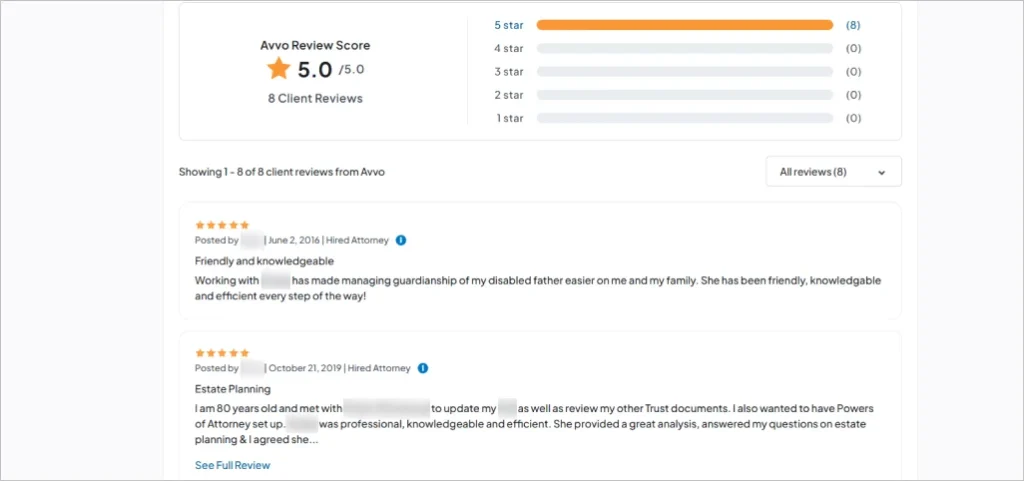
The bottom line? Positive feedback builds your credibility, strengthens conversion rates, and gives potential clients the confidence to choose you Think of every glowing review as a mini billboard, one that works 24/7 with no extra spend.
12. Own the Room with Educational Events and Seminars
Local awareness is paramount! You don’t need a commercial to get attention — you just need a microphone and a message.
Hosting educational workshops and seminars is one of the most powerful ways to inspire confidence in your local community. People get to know you before they need you.
Here are some event ideas for estate planning attorneys:
- “Estate Planning 101” workshops for first-time parents
- Seminars on trusts, probate, or power of attorney
- Joint local events with CPAs or financial planners, and other local organizations
Add a Q&A, record the session, and offer a free consultation to attendees. This positions you as a helpful guide and not just another sales pitch.
Pro Tip: Share event recaps on social media or email to double the exposure. By investing in your local community, you build relationships that last.

Don't Let Your Competitors Steal Your Leads! Comrade gets you more visibility, more leads, and up to 800% ROI.
13. Show Up On Social Media to Inch Past Other Lawyers
Most estate planning firms think very little of social media. That’s great news for you because if you take it seriously, you’ll build a thriving practice!
Social media is your chance to meet clients where they already spend hours every day.
- Facebook: Share local stories, FAQs, or invites to your next webinar.
- LinkedIn: Connect with professionals and referral partners.
- X (Twitter): Drop quick updates or legal insights.
- TikTok: A 60-second clip explaining “Will vs. Trust” or “Probate in Plain English” can rack up thousands of views.
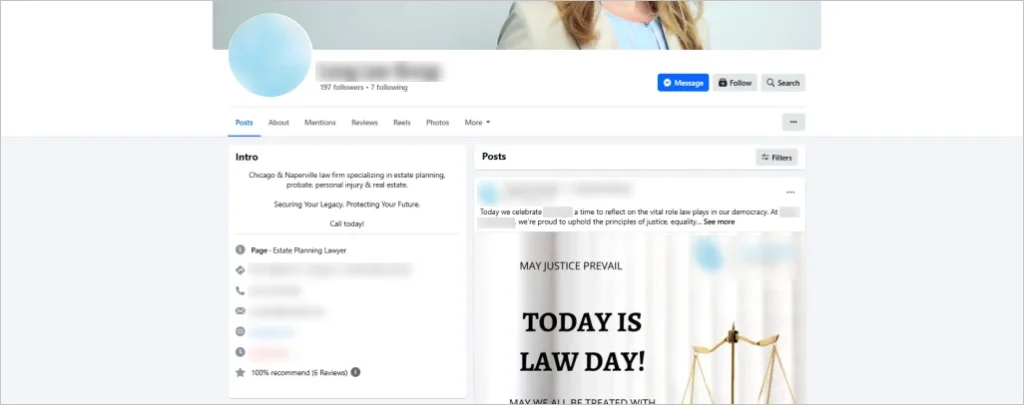
84% of firms with a social presence get clients through it. If you’re not posting, you’re handing those leads to someone else. Remember, many estate planning attorneys are vying for the same leads.
On that note, check out these 8 social media strategies for lawyers to learn where (and how!) to show up.
14. Track What Works (So You Can Do More of It)
After all that hard work… it’s time to track, track, track!
Your digital marketing for estate planning law firms must measure performance. This allows you to double down on what’s working (and of course, ditch what doesn’t). Here’s what to keep an eye on:
- Traffic-to-lead ratio: Are website visitors turning into inquiries?
- Cost per qualified lead (CPL): What are you really paying for clients who matter?
- Channel-specific conversion rates: Compare how SEO strategies, Google Ads, email, or referrals perform side by side.
- Call tracking: Tools like CallRail reveal which campaigns drive phone calls, and whether they last 30 seconds or 30 minutes.
- Form abandonment rate: If people start filling out your form but bail, that’s a red flag.
Take it further by:
- Using Monday.com or ClickUp to manage campaigns.
- Creating SOPs for intake staff to ensure no lead slips through the cracks.
- Delegating decision-making to a marketing manager or agency for faster pivots.
Your law firm is 2x more likely to hit its growth goals if you review your metrics regularly. Don’t fly blind… track, adjust, and scale.
15. Use AI to Personalize and Automate Your Marketing
Lawyers work 10X better with Artificial Intelligence (AI).
Clients expect instant answers, personalized emails, and smooth online experiences. AI makes ALL of that possible without adding more to your plate.
- Chatbots on your site can greet visitors, qualify leads, and book consultations.
- Email AI (e.g., ActiveCampaign) studies your audience and sends emails at the exact time your leads are most likely to open them.
- AI for PPC constantly tweaks your bids and targeting so you stop wasting money on clicks that don’t convert.
- Content AI whips up blog drafts, FAQs, or even video scripts based on the questions your audience is actually asking.
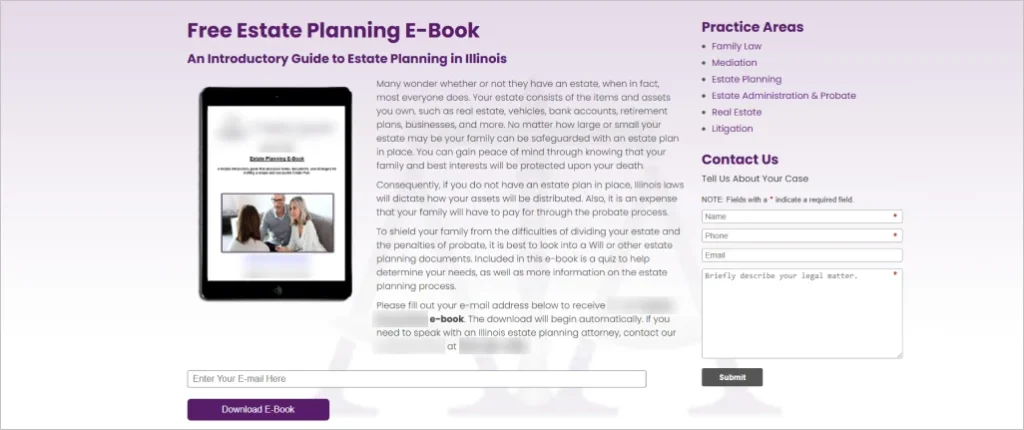
With AI, you can gain back a tremendous amount of freedom and spend more time on your clients and cases.
16. Offer Value with Free Resources (Clients Love This)
Want more estate planning leads? Start by giving value away!
66% of marketers say free resources bring in higher-quality leads.
Free resources like guides, checklists, or eBooks capture their emails while proving your firm is approachable and knowledgeable before clients decide to call.
Great ideas for free resources:
- “5 Estate Planning Documents Every Parent Needs”
- “Living Trust vs. Will” comparison guides
- “End-of-Life Planning Checklist” for older clients
- Annual plan reviews or reminders when laws change
- Family bundle services for households planning together
But don’t stop there — let your clients tell you what they actually want!
Send short surveys after a case, watch for common praises/complaints, and turn that feedback into smarter services.
Combine those two, and you’ll build a long-term pipeline.
17. Ditch Generic Messaging — Personalize Every Client Touchpoint
Estate planning is deeply personal, and your marketing should reflect that.
Instead of sending cookie-cutter messages, use personalized communication to connect with your audience based on their needs, life stage, and goals. Here’s how to do it:
- Segment your list: Group leads into categories like new parents, retirees, or business owners. Each group has different concerns, so tailor your content accordingly.
- Use merge tags: Personalize emails with names, locations, or relevant legal topics based on previous interactions.
- Trigger behavior-based content: If someone downloads a guide on trusts, follow up with content about funding a living trust.
This extra effort is worth it because personalized marketing drives way more qualified leads. The proof: 80% of consumers are more likely to do business with a brand that offers personalized experiences!

Ready to Land Estate Planning Clients? Use our SEO, PPC, and web design services to fill your pipeline.
Book a Free ConsultationFinal Thoughts on How to Get Estate Planning Clients
You didn’t go to law school to become a part-time marketer.
You built your practice to protect families and further legacies. But clients who should be calling you are finding someone else online.
You need a robust estate planning attorney marketing plan today!
Join forces with Comrade. Our SEO, PPC, web design, and content services build you a steady pipeline of qualified leads, month after month.
You could see 10x more high-intent clients and 400%–800% ROI.
Book Your Free Consultation Today

Your no-obligation free Growth Plan:✔ Analyzes your website & SEO performance
✔ Identifies missed opportunities for leads
✔ Builds a roadmap to increase your ranking & conversions
